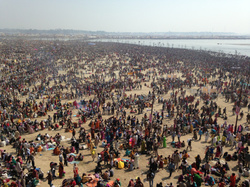Disease Surveillance of the World's Largest Religious Festival

Masses gather for the Kumbh Mela
Aaron Heerboth (MS4), Rishi Madhok, Michael Vortmann and Satchit Balsari from Cornell’s Global Emergency Medicine Program in the Division of Emergency Medicine at New York-Presbyterian Hospital have been working with a team from the South Asia Institute at Harvard to pilot a disease surveillance system. This new disease surveillance system was inspired by EMcounter, a tool originally developed by emergency medicine residents at NewYork-Presbyterian Hospital (NYP) in 2006 to “count” the medical emergencies that presented to casualty wards of hospitals in India. The surveillance system, built by Rishi and implemented under Aaron's leadership, has been a resounding success.
Over 50 faculty, staff and student researchers traveled to Allahabad, India, in January and February 2013 to document and analyze the processes involved in the successful functioning of the Kumbh Mela, the world’s largest religious festival that occurs every twelve years and draws nearly 100 million visitors to a temporary, purpose-built tent city on the banks of the Ganges and Yamuna. Pilgrims come to bathe in the waters that are considered to be holy in the Hindu faith.
The team managed to track over 30,000 patients in 20 days through real-time surveillance, making it one of the largest datasets of its kind in transient mass gatherings. Data was analyzed from four hospitals that served the pilgrim congregants and mapped complaints, medications, diagnoses, and geographical origins. The data allows researchers to discover and follow disease outbreaks and patterns.
The compilation of this mass data set in a transient population may prove a useful example for future public health surveillance in other countries.
Weill Cornell Medicine Center for Global Health
Center for Global Health
420 East 70th Street, 4th Floor, Suite LH-455
New York, NY 10021
Phone: (646) 962-8140
Fax: (646) 962-0285

